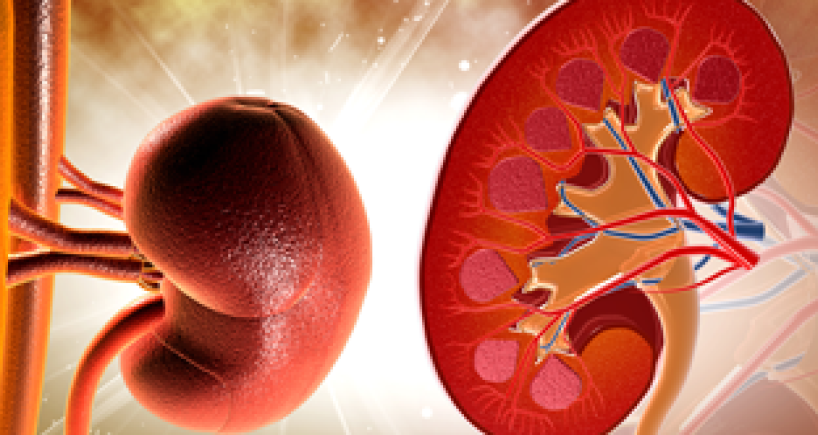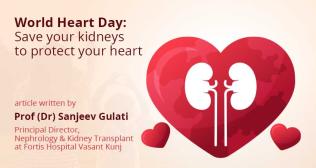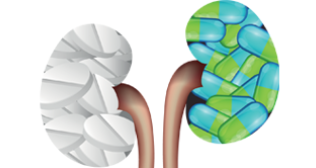
Nephrology
Kidney Disease And Heart Health
Dr. Deepak Kalra Nov 28, 2014
 Chronic Kidney Disease (CKD) is a worldwide public health problem, both for the number of patients and cost of treatment involved. Diabetes is the leading cause of kidney disease accounting for 30 per cent of these patients. Other causes of kidney disease are chronic glomerulonephritis (19.3 per cent), hypertension (14 per cent), chronic interstitial disease and vesico-ureteral reflux (12.6 per cent), obstruction and stone (9.3 per cent), cystic disease and other hereditary diseases (8.4 per cent), undiagnosed (6.2 per cent). Incidence of CKD has doubled in the past 15 years and is rapidly rising. One reason is the rapidly increasing worldwide incidence of diabetes and hypertension. Approximately 30 per cent of patients with diabetes mellitus develop diabetic kidney disease.
CVD BURDEN
Many people with CKD would be surprised to learn that the biggest health risk they face is heart disease.But, it’s true! CKD patients have extremely high risk of developing cardiovascular disease (CVD, angina, heart attack, heart failure, sudden cardiac death, stroke/paralysis and peripheral vascular diseases) compared with the general population, so much so that in the early stages of CKD patients are more likely to develop CVD and die of CVD than they are to progress to ESRD (stage of advanced kidney disease requiring dialysis or renal transplant). This risk is more apparent in younger patients e.g. a 35 year old man on dialysis has the same risk of a cardiovascular death as an 80 year old not on dialysis. In addition CKD patients have a worse outcome with higher mortality after acute myocardial infarction (MI) and have a higher risk of recurrent MI, heart failure and sudden cardiac death.
RISK FACTORS
Much of the problems come from the fact that people with kidney disease often have many risk factors for CVD. Most CKD patients have a combination of 'traditional' and 'kidney-specific' risk factors.
TRADITIONAL RISK FACTORS
Some risk factors have been linked with a higher risk of CVD in the general population. These 'traditional 'risk factors include:
• Smoking
• High blood pressure
• Obesity
• High cholesterol
• Poorly controlled diabetes
• Family history of heart disease
• Male gender
There is increased prevalence of many traditional factors for cardiovascular risk in CKD (age, male gender, hypertension, diabetes, dyslipidemia and physical inactivity).
KIDNEY-SPECIFIC RISK FACTORS
Additional CVD risk factors are the direct result of kidney disease itself. Kidney-specific risk factors include:
• Anaemia
• Inflammation
• Reduced glomerular filtration rate
• Urine protein including albumin
• Abnormal calcium and phosphorus metabolism
• Fluid overload
REDUCING CARDIAC RISKS
A comprehensive approach, rather than isolating treatment to a specific indication is required to lower cardiovascular risk. CKD patients with diabetes should achieve a good control of blood sugar levels by testing blood sugar frequently, taking medicines regularly and on time, and following prescribed meal plan. Drug treatment for hyperlipidemia (increased cholesterol), secondary hyperparathyroidism (calcium and phosphorus metabolism) and anaemia is recommended to decreases the CVD mortality. Folic acid and vitamin B supplements in selected group of patients helps in correcting anaemia and also may decrease CVD risk. An important aspect of strategy to decrease CVD risk in renal disease patients is lifestyle modification. A healthy lifestyle should be maintained by all CKD patients, including dialysis patients. Quitting smoking is very important.
Chronic Kidney Disease (CKD) is a worldwide public health problem, both for the number of patients and cost of treatment involved. Diabetes is the leading cause of kidney disease accounting for 30 per cent of these patients. Other causes of kidney disease are chronic glomerulonephritis (19.3 per cent), hypertension (14 per cent), chronic interstitial disease and vesico-ureteral reflux (12.6 per cent), obstruction and stone (9.3 per cent), cystic disease and other hereditary diseases (8.4 per cent), undiagnosed (6.2 per cent). Incidence of CKD has doubled in the past 15 years and is rapidly rising. One reason is the rapidly increasing worldwide incidence of diabetes and hypertension. Approximately 30 per cent of patients with diabetes mellitus develop diabetic kidney disease.
CVD BURDEN
Many people with CKD would be surprised to learn that the biggest health risk they face is heart disease.But, it’s true! CKD patients have extremely high risk of developing cardiovascular disease (CVD, angina, heart attack, heart failure, sudden cardiac death, stroke/paralysis and peripheral vascular diseases) compared with the general population, so much so that in the early stages of CKD patients are more likely to develop CVD and die of CVD than they are to progress to ESRD (stage of advanced kidney disease requiring dialysis or renal transplant). This risk is more apparent in younger patients e.g. a 35 year old man on dialysis has the same risk of a cardiovascular death as an 80 year old not on dialysis. In addition CKD patients have a worse outcome with higher mortality after acute myocardial infarction (MI) and have a higher risk of recurrent MI, heart failure and sudden cardiac death.
RISK FACTORS
Much of the problems come from the fact that people with kidney disease often have many risk factors for CVD. Most CKD patients have a combination of 'traditional' and 'kidney-specific' risk factors.
TRADITIONAL RISK FACTORS
Some risk factors have been linked with a higher risk of CVD in the general population. These 'traditional 'risk factors include:
• Smoking
• High blood pressure
• Obesity
• High cholesterol
• Poorly controlled diabetes
• Family history of heart disease
• Male gender
There is increased prevalence of many traditional factors for cardiovascular risk in CKD (age, male gender, hypertension, diabetes, dyslipidemia and physical inactivity).
KIDNEY-SPECIFIC RISK FACTORS
Additional CVD risk factors are the direct result of kidney disease itself. Kidney-specific risk factors include:
• Anaemia
• Inflammation
• Reduced glomerular filtration rate
• Urine protein including albumin
• Abnormal calcium and phosphorus metabolism
• Fluid overload
REDUCING CARDIAC RISKS
A comprehensive approach, rather than isolating treatment to a specific indication is required to lower cardiovascular risk. CKD patients with diabetes should achieve a good control of blood sugar levels by testing blood sugar frequently, taking medicines regularly and on time, and following prescribed meal plan. Drug treatment for hyperlipidemia (increased cholesterol), secondary hyperparathyroidism (calcium and phosphorus metabolism) and anaemia is recommended to decreases the CVD mortality. Folic acid and vitamin B supplements in selected group of patients helps in correcting anaemia and also may decrease CVD risk. An important aspect of strategy to decrease CVD risk in renal disease patients is lifestyle modification. A healthy lifestyle should be maintained by all CKD patients, including dialysis patients. Quitting smoking is very important. Categories
Clear allਡਾਕਟਰ ਨੂੰ ਮਿਲੋ

Dr. Deepak Kalra
DIRECTOR NEPHROLOGY | Fortis Shalimar Bagh
- Nephrology | Nephrology
-
18 Years
-
1200



















